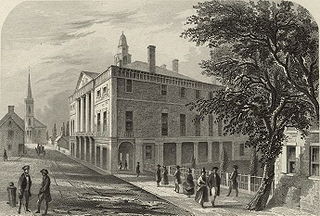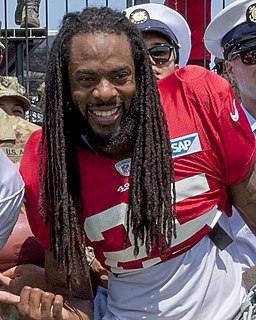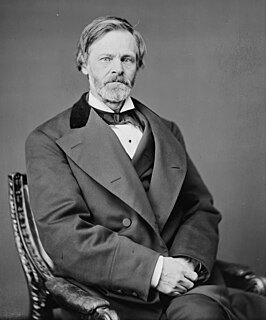
The 1st United States Congress, consisting of the United States Senate and the United States House of Representatives, met from March 4, 1789, to March 4, 1791, during the first two years of George Washington's presidency, first at Federal Hall in New York City and later at Congress Hall in Philadelphia. With the initial meeting of the First Congress, the United States federal government officially began operations under the new frame of government established by the 1787 Constitution. The apportionment of seats in the House of Representatives was based on the provisions of Article I, Section 2, Clause 3 of the Constitution. Both chambers had a Pro-Administration majority. Twelve articles of amendment to the Constitution were passed by this Congress and sent to the states for ratification; the ten ratified as additions to the Constitution on December 15, 1791, are collectively known as the Bill of Rights.

The 2nd United States Congress, consisting of the United States Senate and the United States House of Representatives, met at Congress Hall in Philadelphia, Pennsylvania, from March 4, 1791, to March 4, 1793, during the third and fourth years of George Washington's presidency. The apportionment of seats in the House of Representatives was based on the provisions of Article I, Section 2, Clause 3 of the United States Constitution. Additional House seats were assigned to the two new states of Vermont and Kentucky. Both chambers had a Pro-Administration majority.

Roger Sherman was an early American statesman and lawyer, as well as a Founding Father of the United States. He is the only person to have signed all four great state papers of the United States: the Continental Association, the Declaration of Independence, the Articles of Confederation, and the Constitution.

The Pennsylvania State Senate is the upper house of the Pennsylvania General Assembly, the Pennsylvania state legislature. The State Senate meets in the State Capitol building in Harrisburg. Senators are elected for four year terms, staggered every two years such that half of the seats are contested at each election. Even numbered seats and odd numbered seats are contested in separate election years. The President Pro Tempore of the Senate becomes the Lieutenant Governor of Pennsylvania in the event of the sitting Lieutenant Governor's removal, resignation or death. In this case the President Pro Tempore and Lieutenant Governor would be the same person. The Pennsylvania Senate has been meeting since 1791.

Elections to the United States House of Representatives for the 2nd Congress took place in 1790 and 1791, in the middle of President George Washington's first term. While formal political parties still did not exist, coalitions of pro-Washington (pro-Administration) representatives and anti-Administration representatives each gained two seats as a result of the addition of new states to the union.

Elections to the United States House of Representatives for the 1st Congress were held in 1788 and 1789, coinciding with the election of George Washington as first President of the United States. The dates and methods of election were set by the states. Actual political parties did not yet exist, but new members of Congress were informally categorized as either "pro-Administration" or "anti-Administration".
The Presiding Officer of the United States Senate is the person who presides over the United States Senate and is charged with maintaining order and decorum, recognizing members to speak, and interpreting the Senate's rules, practices, and precedents. Senate presiding officer is a role, not an actual office. The actual role is usually performed by one of three officials: the Vice President; an elected United States Senator; or, in special cases, the Chief Justice. Outside the constitutionally mandated roles, the actual appointment of a person to do the job of presiding over the Senate as a body is governed by Rule I of the Standing Rules.
The United States Senate elections of 1790 and 1791 were the second series of elections of senators in the United States. In these elections, terms were up for the nine senators in Class 1. As of these elections, formal organized political parties had yet to form in the United States, but two political factions were present: The coalition of senators who supported President George Washington's administration were known as the Pro-Administration Party, and the senators against him as the Anti-Administration Party.
The United States Senate elections of 1792 and 1793 were elections of United States Senators that coincided with President George Washington's unanimous re-election. In these elections, terms were up for the ten senators in class 2.

The 1789 United States House of Representatives elections in New York were held on March 3 and 4, 1789, to elect 6 U.S. Representatives to represent the State of New York in the 1st United States Congress.

The 1790 United States House of Representatives elections in New York were held from April 27 to 29, 1790, to elect six U.S. Representatives to represent the State of New York in the United States House of Representatives.

Richard Kevin Sherman is an American football cornerback for the San Francisco 49ers of the National Football League (NFL). He was drafted by the Seattle Seahawks in the fifth round of the 2011 NFL Draft. He has been selected to the Pro Bowl five times and voted All-Pro five times, including three times to the first team. He led the NFL in interceptions in 2013, when he also helped the Seahawks win their first Super Bowl.

Connecticut elected all five of its representatives at-large on a general ticket on September 20, 1790.
Elections for the United States House of Representatives for the 2nd Congress were held in Massachusetts beginning October 4, 1790, with subsequent elections held in four districts due to a majority not being achieved on the first ballot.
Elections to the United States House of Representatives in Pennsylvania were held on October 11, 1791 for the 2nd Congress.

John Sherman was a politician from the U.S. state of Ohio during the American Civil War and into the late nineteenth century. A member of the Republican Party, he served in both houses of the U.S. Congress. He also served as Secretary of the Treasury and Secretary of State. Sherman sought the Republican presidential nomination three times, coming closest in 1888, but was never chosen by the party. His brothers included General William Tecumseh Sherman; Charles Taylor Sherman, a federal judge in Ohio; and Hoyt Sherman, an Iowa banker.

The 1790 United States elections occurred in the middle of President George Washington's first term. Members of the 2nd United States Congress were chosen in this election. Formal political parties did not exist, but Congress was broadly divided between a faction supporting the policies of the Washington administration and a faction opposed to those policies. Despite modest gains for the anti-administration faction, the pro-administration faction retained control of both houses of Congress. Vermont and Kentucky joined the union during the 2nd Congress.
Carl O. Sherman Sr. is an American politician. He is a Democrat who represents District 109 in the Texas House of Representatives.










